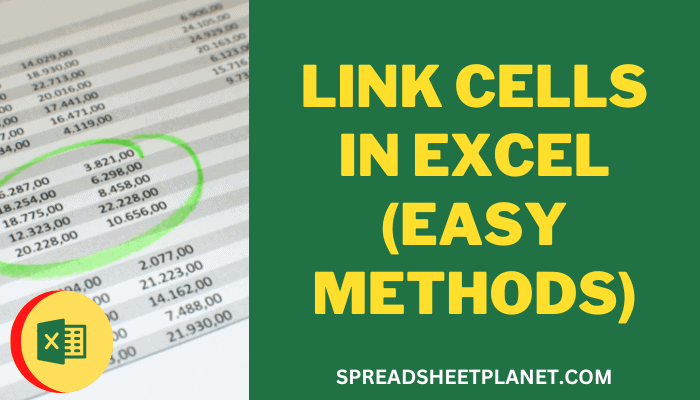Master Excel: Linking Cells Across Sheets Effortlessly

If you've ever found yourself working with complex Excel spreadsheets, you might know how crucial it is to have a well-organized structure. One of the most powerful techniques to manage your data across multiple sheets is linking cells. Whether you're compiling reports, analyzing data, or creating dynamic dashboards, mastering this skill will significantly boost your productivity and accuracy. In this detailed guide, we'll cover the essential steps and tips for linking cells across sheets in Excel effortlessly.
Understanding Cell Linking in Excel

Linking cells across sheets means establishing a connection where the value in one cell automatically updates another cell. Here's why linking cells is beneficial:
- Data Consistency: Ensures your data remains consistent across different parts of your workbook.
- Time Efficiency: Automates data flow, saving you time from manual data entry or copy-pasting.
- Error Reduction: Minimizes human errors that can occur when updating data manually.

Basic Steps to Link Cells in Excel

Here’s how you can link cells between two sheets within the same workbook:
1. Identify the Source and Destination Cells

Decide which cells you want to connect. For example, if Sheet1:A1 holds sales figures for January, and you want to display these figures in Sheet2:B1:
- Open the workbook where you wish to link the cells.
- Navigate to the sheet with the source data (Sheet1).
- Find the cell you need to link (e.g., A1).
2. Start the Linking Process

With your destination sheet (Sheet2) active:
- Select the cell where you want the data to appear (e.g., B1).
- Type the equals sign (=) to begin the formula.
- Switch to the source sheet (Sheet1) by clicking its tab.
- Click on the cell you wish to link (A1).
- Press Enter. Excel will automatically fill in the reference, resulting in a formula like this:
=Sheet1!A1
📌 Note: Remember that Excel uses the sheet name followed by an exclamation mark to reference cells across sheets. If your sheet has spaces or special characters, use single quotes around the sheet name (e.g., ='Sheet 1'!A1).
3. Verify the Link

After setting up the link, you should check that:
- The linked cell (Sheet2:B1) now displays the same value as the source cell (Sheet1:A1).
- When you change the source cell value, the destination cell updates automatically.
Advanced Techniques for Cell Linking

Linking Multiple Cells Across Sheets

For linking multiple cells:
- Use the fill handle or copy-paste the formula while keeping the source sheet name constant.
- If you need to link non-adjacent cells, manually adjust the cell references in the formula.
Using External References

Excel allows linking data from other workbooks, which is particularly useful for sharing data without exporting:
- Open both workbooks.
- In your active workbook, use the Insert Hyperlink dialog or simply type the reference (e.g.,
=[Workbook2.xlsx]Sheet1!A1). - Ensure both workbooks are accessible or your links will break.
🔗 Note: When linking to external files, Excel will prompt you to update links when opening the file if the source workbook is not currently open.
Named Ranges for Easier Linking

Named ranges can simplify the linking process:
- Go to Formulas > Define Name.
- Name your range on the source sheet, e.g., 'SalesData'.
- Use the name in your formula (e.g.,
=SalesData).
Using named ranges can make your formulas easier to read and manage, especially when dealing with large workbooks.
Handling Common Issues with Cell Linking

Here are some common issues and how to resolve them:
Broken Links

- Check if source files have been renamed or moved.
- Use the Edit Links option to update or break links.
Inaccurate Data Due to Formula Errors

- Ensure formula syntax is correct.
- Be cautious of relative and absolute cell references.
Performance Issues

- Overuse of links can slow down your workbook. Keep it balanced.
- Use the Switch Window feature for a smoother experience.
By understanding and addressing these issues, you can maintain the efficiency and accuracy of your linked data.
In summary, linking cells across sheets in Excel is a powerful feature that, when mastered, allows for seamless data management and analysis. You've learned how to create simple and complex links, manage external references, and troubleshoot common linking problems. Remember to use these techniques to enhance your productivity, ensure data integrity, and make your Excel workbooks dynamic and user-friendly.
How do I know if my cell is linked to another sheet?

+
If a cell is linked to another sheet, its formula will include the sheet name followed by an exclamation mark. For example, “=Sheet2!A1” indicates that the cell is linked to cell A1 in Sheet2.
Can I link to a specific cell in a closed workbook?
+Yes, Excel supports linking to cells in closed workbooks. You’ll need to use an external reference (e.g., [Workbook2.xlsx]Sheet1!A1), but the workbook must exist on your computer or accessible server when you try to update links.
What happens if I delete or rename the source sheet?
+If you delete or rename the source sheet, Excel will report an error, showing #REF! in the cells that were linked to it. You’ll need to either restore the sheet, update the link, or remove the link.



